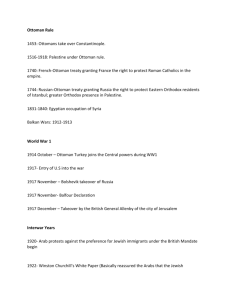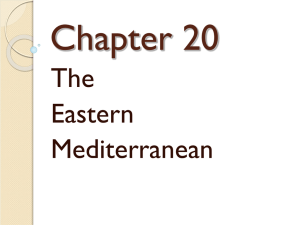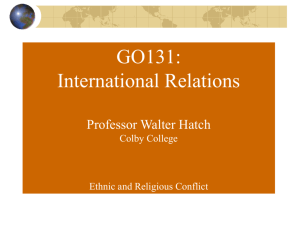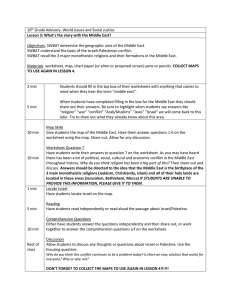Printed for the Cabinet. April Wh April, Introductory SECRET
advertisement
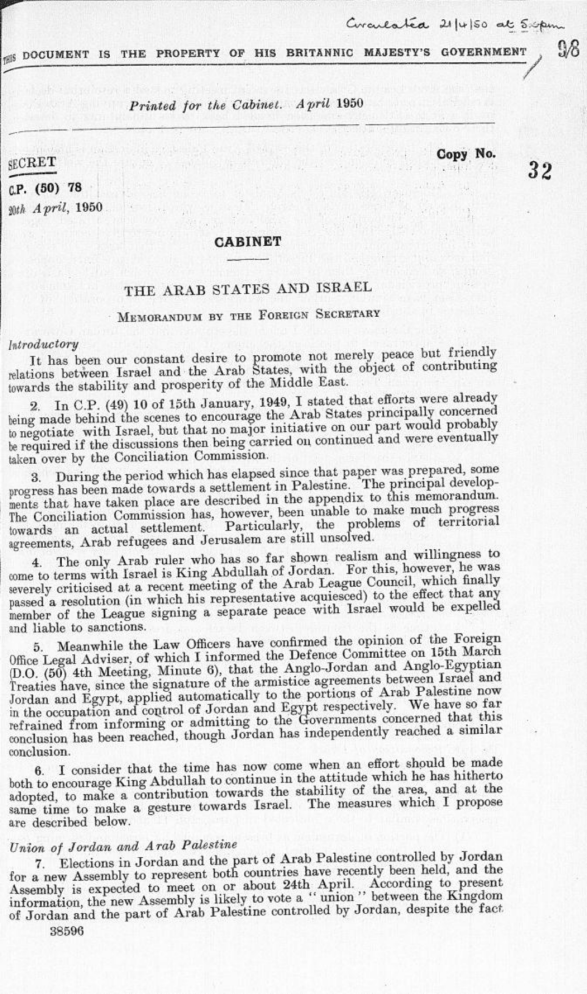
Printed for the Cabinet. April 1950 Copy No. SECRET CP. (SO) 78 Wh April, 1950 CABINET THE ARAB STATES AND ISRAEL MEMORANDUM BY THE FOREIGN SECRETARY Introductory I t has been our constant desire to promote not merely peace but friendly relations between Israel and the A r a b States, with the object of contributing towards the stability and prosperity of the Middle East. 2. I n C P . (49) 10 of 15th J a n u a r y , 1949, I stated that efforts were already being made behind the scenes to encourage the A r a b States principally concerned to negotiate w i t h Israel, but t h a t no major initiative on our p a r t would probably be required if the discussions then being carried on continued and were eventually taken over by the Conciliation Commission. 3. During the period which has elapsed since that paper was prepared, some progress has been made towards a settlement in Palestine. The principal develop­ ments t h a t have taken place are described in the appendix to this memorandum. The Conciliation Commission has, however, been unable to make much progress towards an actual settlement. Particularly, the problems of territorial agreements, A r a b refugees and Jerusalem are still unsolved. 4. The only A r a b ruler who has so far shown realism and willingness to come to terms with Israel is K i n g Abdullah of J o r d a n . For this, however, he was severely criticised at a recent meeting of the A r a b League Council, which finally passed a resolution (in which his representative acquiesced) to the effect t h a t any member of the League signing a separate peace with Israel would be expelled and liable to sanctions. 5. Meanwhile the L a w Officers have confirmed the opinion of the Foreign Office Legal Adviser, of which I informed the Defence Committee on 15th March (D.O. (50) 4th Meeting, Minute 6), t h a t the Anglo-Jordan and Anglo-Egyptian Treaties have, since the signature of the armistice agreements between Israel and Jordan and Egypt, applied automatically to the portions of A r a b Palestine now in the occupation and control of J o r d a n and E g y p t respectively. W e have so f a r refrained from informing or admitting to the Governments concerned that this conclusion has been reached, though J o r d a n has independently reached a similar conclusion. 6. I consider t h a t the time has now come when an effort should be made both to encourage K i n g Abdullah to continue in the attitude which he has hitherto adopted, to make a contribution towards the stability of the area, and at the same time to make a gesture towards Israel. The measures which I propose are described below. Union of Jordan and Arab Palestine 7. Elections in J o r d a n and the p a r t of A r a b Palestine controlled by J o r d a n for a new Assembly to represent both countries have recently been held, and the Assembly is expected to meet on or about 24th April. According to present information, the new Assembly is likely to vote a '' union ' ' between the Kingdom of J o r d a n and the p a r t of A r a b Palestine controlled by Jordan, despite the fact 38596 that the A r a b League Council at its recent meeting passed a resolution declaring A r a b Palestine to be a " trust territory." to be held by the occupying A r a b Powers until a final settlement and then handed back to its inhabitants to determine their own future status. 8. The incorporation of this p a r t of A r a b Palestine in J o r d a n is undoubtedly the only logical solution and the one best calculated to ensure the welfare of its inhabitants. 9. Moreover, H i s Majesty's Minister to Israel has advised that the union with Jordan of those parts of A r a b Palestine which J o r d a n now administers where a large proportion of the A r a b refugees are now concentrated, together with the knowledge t h a t the Anglo-Jordan Treaty applies to that territory, would be an important contribution towards the stability of that area. He considers that it would strengthen the Israel Government against expansionist opposition groups, and encourage them to seek a settlement with J o r d a n on the basis of the present provisional frontier. H i s Majesty's Representatives at Amman and Jerusalem have similarly urged the advantages of the incorporation of Arab Palestine in Jordan. 10. For the above reasons, I am of the opinion that the J o r d a n Government should be encouraged to proclaim the union of A r a b Palestine with Jordan as they have hitherto intended to do, and that if and when this union is proclaimed, H i s Majesty's Government should recognise it and announce that in their view the Anglo-Jordan Treaty automatically applies to that p a r t of Arab Palestine now united with J o r d a n . 11. I n making such an announcement, it would be necessary to make two reservations :— (1) in regard to the portion of Jerusalem at present occupied by Jordan, since this forms p a r t of the area which, under the terms of the United Nations Assembly resolution of 9th December, 1949, was scheduled for internationalisation; (2) in regard to the frontier between A r a b Palestine and Israel, which was provisionally laid down under the armistice agreement signed between the two countries on 3rd April, 1949, but which, pending a final settlement between them, is subject to modification by free negotiation. This reservation could be to the effect that H i s Majesty's Government regard the territory of J o r d a n to which the Anglo-Jordan Treaty of 1948 is applicable as being bounded by the armistice line laid down in the Armistice Agreement signed between Israel and Jordan on 3rd April, 1949, or any modification thereof which shall be agreed upon by the two States under the terms of that Agreement, until such time as the frontier between Israel and J o r d a n is determined by a final settlement between them. 12. I should also wish to take this opportunity of stating that we have no intention of establishing British military bases in peace-time in the portion of A r a b Palestine now to be united to J o r d a n . The Israel Government, who attach importance to this point, were informed in this sense in December 1949, but have asked for the fact to be made public for reasons of internal politics. The Jordan Government axe already aware of the position. De J u r e Recognition of Israel 13. I have for some time past been considering de jure recognition of the State of Israel. I am of the opinion t h a t a recognition of the union of Arab Palestine with J o r d a n might be a suitable moment to announce this. 14. Be jure recognition of Israel would require to be accompanied by reservations similar to those indicated in p a r a g r a p h 11 above, i n regard to— (1) The portion of Jerusalem at present occupied by Israel and forming part of the area scheduled under the Assembly resolution for inter­ nationalisation ; and (2) IsraePs frontiers w i t h her A r a b neighbours, which have been provision­ ally laid down under the armistice agreement signed with the foul Arab countries concerned and all of which are subject to modification by free negotiation. The latter reservation would be in the form indicated in p a r a g r a p h 11 (2) above mutatis mutandis. I t would be particularly important in the case of the frontier between Israel and Egypt. H i s Majesty's Ambassador at Cairo has pointed out that the Egyptians still attach great store to rectifying their frontier with Israel in the Negev, in view of the fact that Israel occupied this area in the winter of 1948-49, subsequent to the cease-fire ordered in the Security Council resolution of 18th July, 1948. H e has suggested that de jure recognition of Israel by the United Kingdom, by seeming to endorse these Israeli acquisitions of territory, might be badly received in Egypt. I consider that reservation (2) above should suffice to meet this point. 15. H i s Majesty's Ambassador at Cairo has also suggested that de jure recognition might stiffen the attitude of the Israel Government in regard to future negotiations with Egypt. On the other hand, His Majesty's Minister at Amman has pointed out t h a t the present Israel attitude renders the chances of successful Israel-Egypt negotiations remote, and that, for many cogent reasons, a settlement between Israel and J o r d a n should not be delayed. 16. I am of the opinion that the balance of advantage lies in proceeding as proposed. General Statement of Policy in the Middle East 17. Finally, these two acts of recognition by H i s Majesty's Government might afford a suitable occasion to reaffirm that our policy in the Middle East aims a t the establishment of peace and security in t h a t area and in particular a settlement between Israel and the Arab States; and that we are determined to use all our influence both within and outside the United Nations to prevent the use of force or threat of force by any State in the Middle East against any other such State, in a manner inconsistent with the Charter of the United Nations. The United States Government have already made a statement on these general lines. s Recommendation 18. To sum up, the action which I propose, and to which I ask my colleagues to agree, is as follows : — (1) If and when a union of A r a b Palestine with J o r d a n is proclaimed by King Abdullah, to announce H i s Majesty's Governments recognition of this union and their view that the provisions of the Anglo-Jordan Treaty apply to the areas united to Jordan, with reservations as regards the frontier between A r a b Palestine and Israel and as regards Jerusalem, and a reference to our intention not to establish bases in these areas. (2) Simultaneously to announce H i s Majesty's Governments de jure recognition of Israel, with similar provisos in regard to Jerusalem and the frontiers of Israel with her A r a b neighbours. (3) To make a statement reaffirming H i s Majesty's Governments desire for peace in the Middle East and their opposition to the use of force between Middle Eastern States. E. B. 20th April, 1950. - APPENDIX RECENT DEVELOPMENTS IN REGARD TO PALESTINE Since the preparation of C P . (49) 10 of 15th J a n u a r y , 1949, the following­ developments have occurred regarding the Palestine problem:— (a) Armistice Agreements were signed in 1949 between Israel and Egypt, the Lebanon, J o r d a n and Syria : (b) Following the signature of these Agreements, the Security Council lifted the arms embargo on 11th August, 1949 : (c) On 9th December, 1949, the General Assembly passed a resolution regard­ ing the internationalisation of Jerusalem which, however, both Israel and J o r d a n have categorically rejected : (d) J o r d a n has been negotiating w i t h Israel for a final settlement of all outstanding problems. These negotiations were suspended at the end of February pending the results of the elections in A r a b Palestine and Jordan : (e) The elections in A r a b Palestine and J o r d a n have taken place and it is clear t h a t they are intended as a preliminary to the union of the two countries. This is dealt with in greater detail in p a r a g r a p h 5 of the main paper : (/) The United Nations Relief and Works Agency for Palestine Refugees, established by the General Assembly resolution of 9th December, 1949, is about to start work.


